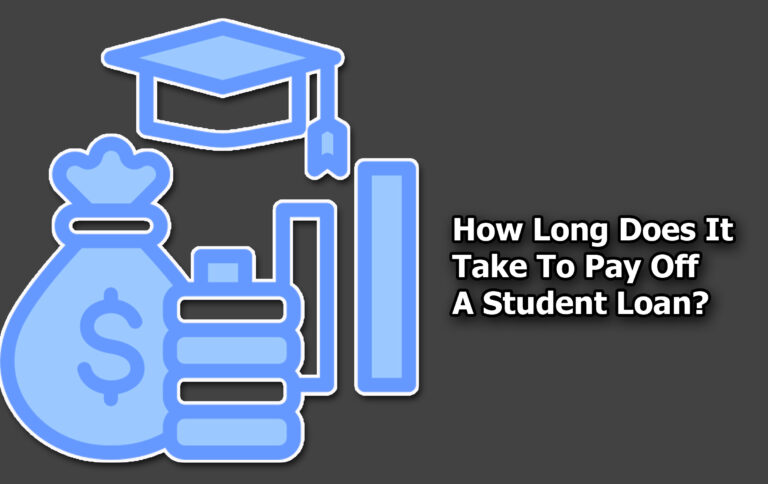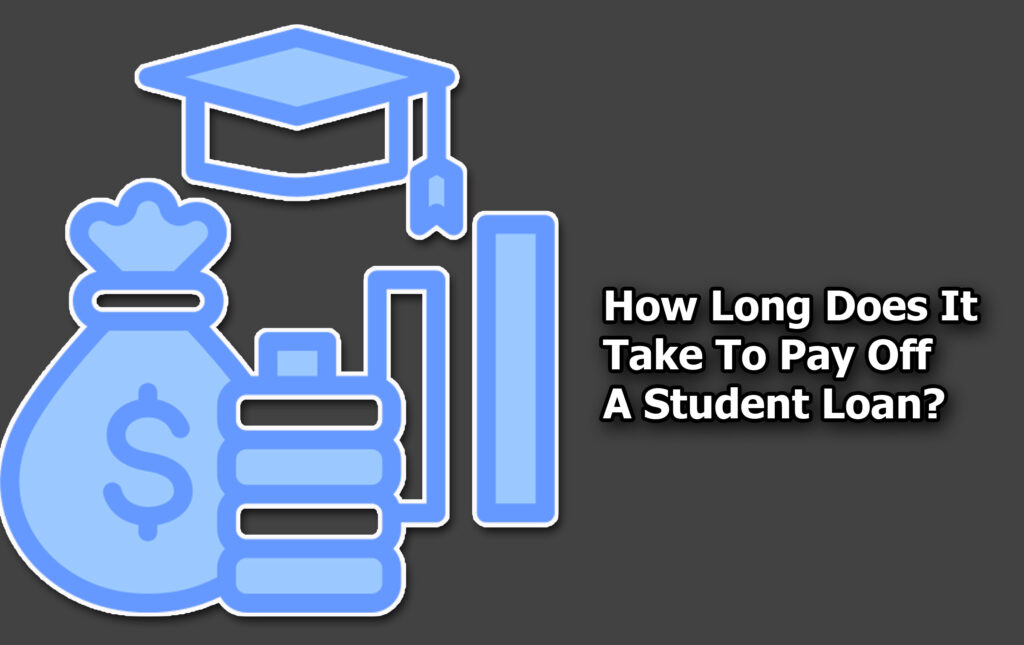
How long does it take to pay off a student loan? Student loans have become a major part of many people’s lives. It has helped millions pursue higher education, yet it often results in long-term financial responsibilities.

Whether you’re fresh out of college or several years into your repayment journey, one of the most common questions borrowers ask is: “How long will it take to pay off my student loan?”
The answer isn’t always simple. It depends on various factors, including the loan type, repayment plan, total balance, interest rates, and your income level.
Furthermore, understanding the timeline and factors that influence how quickly you can repay your student loan is essential to managing your finances effectively.
Also, knowing your options can help you avoid years of unnecessary debt and even save thousands in interest. We’re going to start off by looking at the available repayment timelines open to people with student loans to pay off.
Standard Repayment Timelines
Most federal student loans automatically fall under the Standard Repayment Plan, unless you choose a different option. This plan is structured to pay off your loan in 10 years, with equal monthly payments made throughout the period.
Under the standard plan, the loan term is 10 years, they allow fixed monthly payments and it is best for borrowers who can afford steady payments and want to minimize interest.
What’s more, private student loans also often use a similar standard repayment term, usually between 5 to 15 years, depending on the lender and loan agreement. The shorter the term, the higher the monthly payment—but the less you’ll pay in interest over time.
Extended and Graduated Repayment Plans
If the standard plan feels too aggressive for your budget, there are other federal loans options available like Extended and Graduated Repayment Plans. This repayment plan is designed to stretch out payments and ease your monthly burden. So their features include:
- Term length of up to 25 years
- Eligible for borrowers with over $30,000 in federal loans
- Payments are fixed or graduated
- Pros: Lower monthly payments
- Cons: Higher overall interest due to longer repayment
On the other hand, for the Graduated Repayment Plan, it has:
- Term Length of up to 10 years (or 25 years for consolidated loans)
- You can start making payments slow and increase every 2 years
- It is also best for borrowers expecting rising income over time
While both plans help ease monthly payments, they often result in higher total repayment costs due to extended interest accrual.
Income-Driven Repayment (IDR) Plans
Another repayment plan option on paying back student loans is the IDR Plans. The Income-driven repayment plans are tailored to your income and family size, which makes them ideal for borrowers with high loan balances relative to their earnings. The main federal IDR plans include:
- Income-Based Repayment (IBR)
- Pay As You Earn (PAYE)
- Revised Pay As You Earn (REPAYE)
- Income-Contingent Repayment (ICR)
The key features of this repayment model include:
- Loan term of up to 20 or 25 years
- Payments include 10% to 20% of your discretionary income
- Any remaining balance is forgiven after the repayment term (though it may be taxed)
While these plans make loans more manageable, they often extend the repayment timeline significantly. However, they also protect borrowers from financial hardship and offer the benefit of forgiveness if the full balance isn’t repaid after the term ends.
How Extra Payments Can Shorten Your Loan Term
Paying extra, even a little, can have a huge impact on how long it takes to pay off your student loans. This strategy helps you pay off the principal faster, which in turn reduces the interest you’ll pay over time.
Here are some tips for making early repayments:
- Make by weekly instead of monthly payments
- Round up your monthly payment
- Use windfalls (bonuses, tax refunds) for lump sum payments
- Target highest-interest loans first (avalanche method)
Always inform your lender that extra payments should go toward principal, not future installments. This ensures that you actually reduce the loan term rather than just delaying your next due date.
Factors That Influence Your Repayment Timeline
No two borrowers are the same, and the actual time it takes to pay off a student loan can vary widely based on the following factors:
- Loan Amount: Higher balances naturally take longer to pay off
- Borrower Discipline: Staying consistent and avoiding deferment or forbearance matters
- Interest Rate: Higher interest can slow progress unless offset by larger payments
- Monthly Payment Amount: The more you pay, the faster the loan disappears
- Repayment Plan: Choosing extended or income-driven plans can lengthen the term
Frequently Asked Questions
Can I Pay Off My Student Loans Faster Than The Scheduled Plan?
Yes. There are no penalties for early repayment on federal and most private student loans. What’s more, making extra payments reduces the principal and shortens the loan term.
Will My Loan Be Forgiven If I Still Owe Money After 20 Or 25 Years?
If you’re enrolled in an Income-Driven Repayment plan, any remaining balance may be forgiven after 20 or 25 years. However, forgiveness may be considered taxable income.
Is There An Ideal Repayment Plan For Everyone?
No. The best plan depends on your income, loan amount, career goals, and financial situation. What’s ideal for one borrower might be inefficient for another.